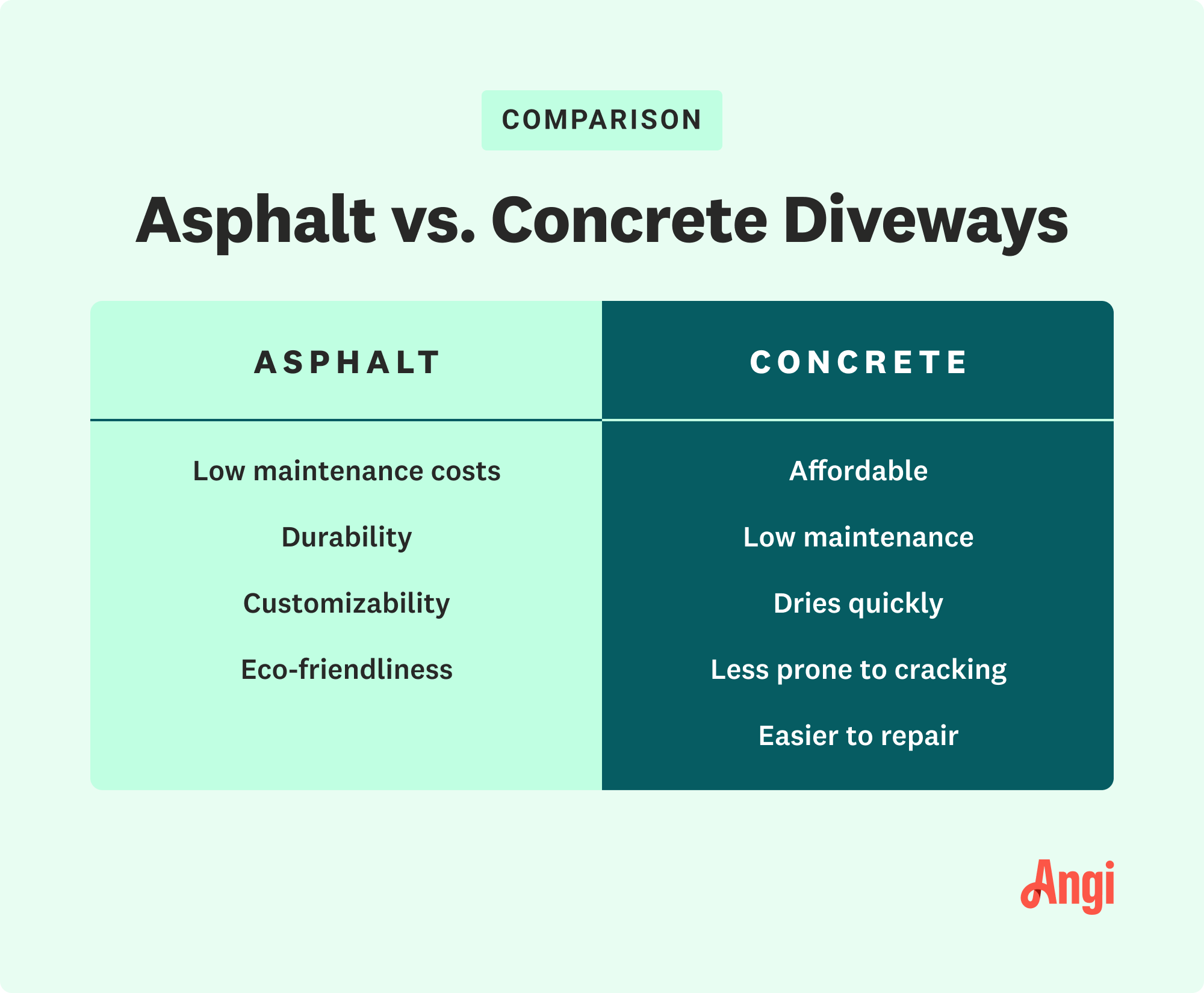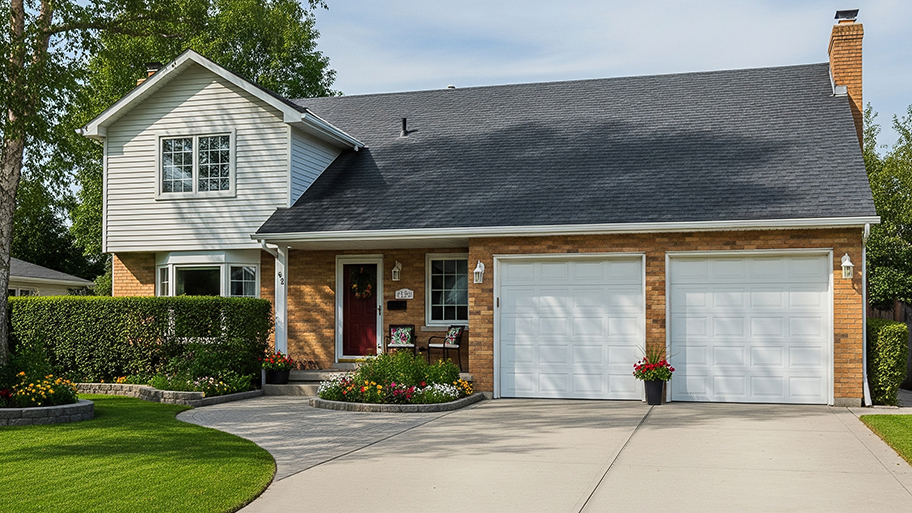
Whether you’re planning on putting in a concrete driveway, patio, or staircase, use this concrete delivery cost guide to get an accurate estimate.
Two driveway heavy-hitters duke it out—asphalt vs. concrete


Concrete driveways are better in warmer climates, while asphalt fares better in the cold.
Concrete can cost more at installation, but it has less expensive ongoing maintenance.
Asphalt is much easier to install than concrete, and you can drive on it immediately.
Upgrading your driveway can level up the whole look of your house and boost its curb appeal. But, if you’re taking on this project, you may find yourself asking which is better: an asphalt or a concrete driveway? In this guide, we’ll explain the differences between an asphalt vs. concrete driveway to help you decide which is best for your home.
The biggest difference between an asphalt and concrete driveway is the climate in which each is most appropriate. Asphalt will get tacky in hot temperatures, so it’s not ideal in hotter climates, but it’s less porous and less likely to crack in freezing temperatures. Concrete will sustain damage more quickly than asphalt in cold climates, but even extreme heat won’t be an issue.
When taking on this project, expect questions only a pro can answer. With our network of local pros, you'll get the job done and your questions answered—without the hassle and stress of doing it yourself.
A concrete driveway is a mixture of cement, sand, gravel, and water, which cures into a porous slab, usually with rebar reinforcement for longevity. Durability is one of the key advantages of concrete driveways, as they can hold up an immense amount of weight without cracking or getting damaged.
| Pros | Cons |
|---|---|
| High heat resistance | Cracks in cold |
| Extreme strength | Long curing time |
| 30+ year life | More expensive |
| Minimal maintenance | |
| Customizable |
Best For:
Moderate and hot climates
Longer lifespan
Homeowners looking for minimal maintenance
Homeowners who want to customize their driveway appearance
Concrete is highly durable and can last for 50 years or more with proper maintenance and the correct concrete driveway thickness. This material has the ability to withstand heavier loads, making it an excellent option for driveways that need to accommodate trucks and RVs. It also stands up much better in extreme heat and will never become tacky or pliable like asphalt will.
While the initial cost of concrete may be higher compared to asphalt, it requires less maintenance, making it a more cost-effective choice in the long run.
Concrete also offers a high level of customization, including different types of concrete, staining options, finishes, and more. However, it's important to note that customized designs may come at an additional cost. Consulting with local concrete driveway professionals near you will help you bring your dream design to life.
Concrete driveways are susceptible to cracking, particularly in regions with fluctuating temperatures. Freezing and thawing cycles can cause the concrete to crack, leading to unsightly gaps and potential damage. It can help to brush up on how to prevent concrete from cracking before installing this type of driveway. However, you’ll eventually need repairs, and repairs will be more expensive than those for asphalt driveways.
How long it takes concrete to dry is another factor to consider. Unlike asphalt, which can handle vehicle loads within 24 to 48 hours, concrete needs to cure for seven days before you drive on it.
Finally, the initial cost of installing a concrete driveway is higher compared to asphalt, with prices ranging from $3 to $10 per square foot. This makes it a more expensive option for homeowners, especially for larger driveways.

Asphalt driveways are made from aggregates like rocks and sand and bitumen—which is derived from crude oil—to hold the aggregates together. Local asphalt pros use high temperatures to soften, mix, and roll before it cools and becomes a solid driveway.
| Pros | Cons |
|---|---|
| More affordable | More maintenance |
| Dries quickly | Shorter lifespan |
| Resists cold better | Gets tacky in heat |
| Affordable repairs |
Best For:
Driveways in colder climates
A more affordable installation
Homeowners who can’t wait a week to use their driveway
Asphalt is usually a more affordable option than concrete for driveway installation. It’s also more affordable to repair, although you will need repairs and maintenance more often.
Unlike concrete, you can drive on asphalt driveways within 24 to 48 hours after pouring. This allows for quicker accessibility and use of the driveway than the 7+ days you’d have to wait for concrete to cure.
The biggest upside to asphalt driveways is that they’re less prone to cracking, especially in colder climates. The material isn’t as porous, so water won’t soak into it and freeze. Asphalt is also more flexible than concrete, so it can adapt better to changes in soil pressure. If you have clayey soil that expands and contracts with changes in moisture, asphalt will likely stand up better.
An asphalt driveway will last for 15 to 30 years, which is on the lower end of what you’d get from a concrete driveway. Concrete slabs will last for 30 to 50 years with proper maintenance. Asphalt driveways also need maintenance more often than concrete driveways. You’ll need to apply a coat of sealant every two to three years, and you’ll need resurfacing every three to five years.
Asphalt driveways aren’t ideal in hotter climates, as they get tacky in high heat and will often be hotter than ambient temperatures due to their black color.
Finally, asphalt gives you minimal opportunity to customize the appearance of your driveway. You can line it with brick, crushed concrete, gravel, or pavers, but you’ll have to stick with the black color that the bitumen imparts. Concrete gives you options for different stain colors and surface finishes.
Ready to compare asphalt versus concrete driveways? Here’s how the two options stack up.
Concrete driveways cost more upfront, averaging $6,400. Asphalt driveways cost an average of $5,248. However, asphalt driveways will require more ongoing maintenance, including resealing and resurfacing every few years, whereas concrete driveways may need minor repairs once every decade or so. The costs over time will be about equal.
Concrete driveways are highly durable and can last for 50 years or more with proper maintenance, which is why some homeowners pour concrete over an asphalt driveway as an affordable upgrade. They can withstand heavier loads up to around 80,000 pounds, making them suitable for accommodating trucks and RVs. Asphalt driveways have a shorter lifespan of around 15 to 30 years. They are still durable when properly maintained, but they are generally considered less durable than concrete driveways and will only hold around 8,000 pounds.
Concrete driveways offer a high level of customizability, allowing homeowners to match their home's color palette or create unique patterns. You can choose to stain, stamp, engrave, or tint concrete with various colors, providing a visually appealing finish. Asphalt driveways are always black, and surface finish options are non-existent.
Asphalt is easier to install, which is a big reason why the cost is lower. However, both are relatively complicated and involve specialized tools, so in either case, it’s best to hire either a local driveway paving company or a concrete professional to get the job done properly.
Concrete driveways are more durable and require fewer repairs, but when it’s time to carry out repairs, you’ll have an easier job repairing asphalt. Matching the color and texture of existing concrete can be difficult, resulting in a noticeable patchwork appearance. Asphalt driveways are easier to repair, especially for common issues like cracks and potholes. You can even do many repairs as do-it-yourself projects, and the repairs blend seamlessly with the rest of the driveway.
Concrete driveways can enhance the curb appeal of a property, offering a visually pleasing and customizable look. That means concrete driveways boost home value more than an asphalt driveway, especially if it matches the overall aesthetics of the neighborhood.
Concrete is an eco-friendly material that is recyclable, and its long lifespan reduces resource consumption and waste. Asphalt is also considered relatively environmentally friendly. It is recyclable, and its production requires 20% less energy compared to other materials.
Concrete driveways have low maintenance costs, making them a more cost-effective choice in the long run. Occasional power washing and degreasing are necessary to maintain the appearance, but beyond that, they’re mostly maintenance-free.
Asphalt driveways require regular maintenance to prolong their lifespan. You’ll need to apply a coat of sealant every two to three years and resurface every three to five years. The naturally dark color of asphalt hides stains, but maintenance requirements will still be more intensive to keep the surface looking good.
You should not install your own driveway. This is not a DIY task unless you’re a contractor yourself. Hire a concrete contractor or paving company, and make sure you shop around to find the best fit for your needs. Compare multiple quotes and ask about any warranties and additional coverages or if they offer discounts for maintenance services. You should also make sure the contractor is familiar with installing the type of driveway you want. Asking for past project photos and references is a great way to screen your contractors.
From average costs to expert advice, get all the answers you need to get your job done.

Whether you’re planning on putting in a concrete driveway, patio, or staircase, use this concrete delivery cost guide to get an accurate estimate.

Between the endless customizations and decades of strength, the cost of a concrete driveway may be worth the investment. Let's break down your bottom line.

Concrete driveways stand up to a lot of pressure over the years. How much do concrete driveway repairs cost when it's time to give it a little TLC?

Concrete flooring is a durable, low-maintenance option for your home. Learn the pros and cons of concrete floors to decide if they’re right for you.

Looking for a durable and more affordable alternative to a concrete driveway? Learn about crushed concrete driveway costs and if it’s a good option.

Learn about how thick a concrete driveway should be and what factors affect the thickness before pouring concrete to ensure safety and durability.